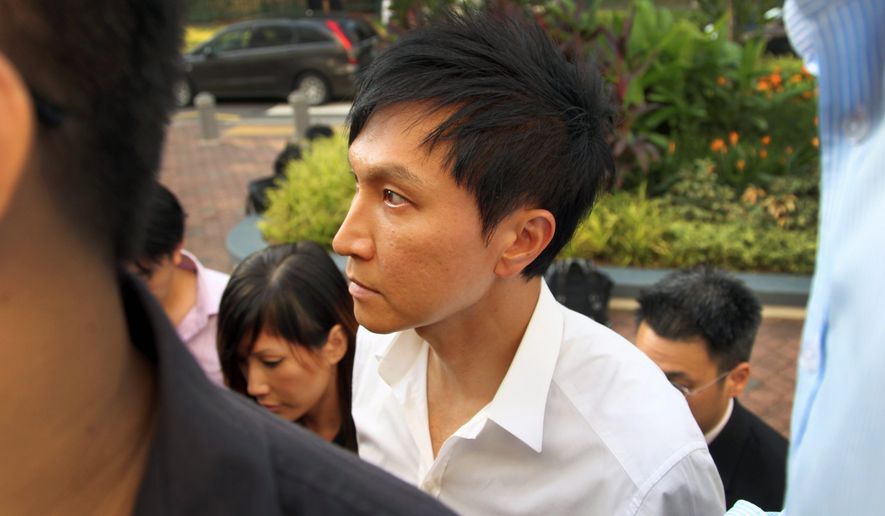Religious freedom? Or misuse of church funds? Those are the questions surrounding the ongoing corruption trial of a megachurch founder in Singapore who has won support from international religious leaders such as Pastor A.R. Bernard.
“Change is taking place in the nation [of Singapore] that is part of a bigger picture,” Mr. Bernard, founder of the 30,000 member-plus Christian Cultural Center in Brooklyn, said of Singapore’s charges against Pastor Kong Hee.
“We don’t pick and choose history. History happens when social, political, economic and even spiritual forces come together and effect change,” said Mr. Bernard, a staunch supporter of Mr. Kong.
A charismatic evangelist, Mr. Kong founded the City Harvest Church in Singapore in 1989 with his wife, Sun Ho.
In 2012 Mr. Kong and five other church members were accused of financial misdeeds, and the high-profile criminal trial has kept the 20,000-member megachurch under a cloud.
Last week a former church member who acted as an investment manager testified about an estimated $19 million in church-building funds that were used to buy investment bonds for two church-related companies that promoted the music career of Ms. Ho, the church’s music pastor, and another $21 million that was used to show that the bonds had been redeemed.
SEE ALSO: Rick Santorum echoes Reagan’s call for religious freedom with new film
Prosecutors, who started investigating the church around 2009, say the investment companies and bonds were “shams,” and church elders are guilty of a conspiracy to commit criminal breach of trust with the building funds.
The church says the investment bonds were legitimate and returned to the church in full with interest, and no money was lost in the transactions.
Initial charges against Ms. Ho have been dropped. The six accused elders face up to 20 years imprisonment.
Prosecutors with the Commercial Affairs Department of the Singapore Police Force and the Office of the Commissioner of Charities are conducting the trial before Presiding Judge of the State Court of Singapore See Kee Oon. The judge ruled in May that a “prima facie” case of misappropriation had been made.
Mr. Kong’s international supporters include Pentecostal Pastor Mary Hudson, co-founder of the Keith & Mary Hudson Ministries in Santa Barbara, California, and mother of pop star Katy Perry; Paul Scanlon, founder of LIFE Church, a large charismatic-based congregation in Bradford, England; and evangelist Phil Pringle, senior pastor of C3 Church in Sydney, Australia, and an advisory pastor of Mr. Kong’s City Harvest Church. Each of them has traveled to Singapore to uplift the spirits of Mr. Kong’s congregation.
Pastor Casey Treat, who leads the Christian Faith Center in Washington with his wife, Wendy, said Monday that “Pastor Kong has been a great leader of the church in Singapore and an influence throughout the world.”
“I have never seen a compromise or unbiblical behavior. He and his family have been a blessing to our church in Seattle,” Mr. Treat said in an email to The Washington Times.
The bigger picture, he said, is that Singapore’s religious freedoms are not identical to those in the U.S. Accepted practices here, such as churches and charities using their own films and “crossover artists” who perform religious and secular music for evangelism, are “strange” in Singapore, he said.
So when the Singapore church leaders chose to use Ms. Ho’s music for evangelism — she performed especially well in Chinese markets — and took steps to promote her, those actions were misinterpreted, Mr. Bernard said.
Mr. Kong has “made a few mistakes in judgment,” Mr. Bernard said without elaborating, but he “never did anything illegal, never did anything to the inurement of his own pockets or that of his wife.”
“His case is really setting precedent. It’s a test case” about government controls, Mr. Bernard said, noting that recent news articles have discussed the emerging influence of Christian churches in Singapore — where a third of the people are Buddhist — and have called for the government to restructure itself to be “sensitive” to special interest groups.
Singapore’s blogosphere has followed the trial with keen interest, remarking on everything from Ms. Ho’s up-and-down music career to the ethics of “mixing” secular and religious practices.
The prosecution’s opening statement in May 2013 “ridiculed” the church leaders’ contention that “pop music was a tool of evangelism that would help spread God’s message,” according to The Associated Press.
The “reason you were trying to sweep the transactions with [artist management company] Xtron under the carpet is because that’s what you do if your house is dirty and a visitor might be turning up unexpectedly,” Deputy Public Prosecutor Christopher Ong said to Mr. Kong when he took the stand in September, according to The Christian Post.
The 50-year-old pastor replied that after certain bloggers developed “misconceptions” about what they were doing with their popular Crossover Project, which featured his wife, the church members took steps to clarify the ties between the church and Xtron.
At least one defendant — former member Chew Eng Han — has distanced himself from Mr. Kong’s statements, saying he did not overrule the pastor in financial decisions, and the goal was to promote Ms. Ho.
A final ruling in the trial could come this summer.
• Cheryl Wetzstein can be reached at cwetzstein@washingtontimes.com.




Please read our comment policy before commenting.